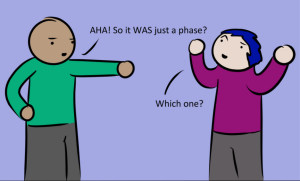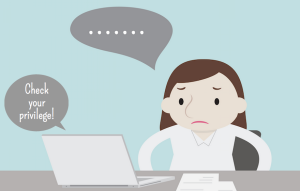
A person holds a cup of coffee and looks out a window, upon which is a reflection of mountains and a sunrise.
If you’ve ever been told that you’ve harmed someone and felt so stricken with guilt, anxiety, or self-hatred that you couldn’t move forward, this article is for you.
Lots and lots has been written about the importance of apologizing when you’ve messed up, and how to do it well. That’s because it’s not easy and it’s not something most of us learn growing up.
One of the hardest things about apologizing is dealing with your feelings. It never feels good to get called out or to be told that you’ve hurt someone.
For folks with histories of mental illness, trauma, or oppression, it can be especially hard, because being told that we’ve messed up can bring up all kinds of feelings of worthlessness, anxiety, or even self-hatred.
Unfortunately, people sometimes use that as an excuse to avoid apologizing and being accountable. Many of us have friends or partners who break down whenever we called them in or out on something or asked them to change their behavior, no matter how gently we try to do it.
This can even be a pattern of abuse, where every time you try to tell someone they’re making you feel bad, you end up being made to feel guilty for even bringing it up.
That’s why a lot of advice about apologies and accountability implies (or explicitly states) that your feelings about messing up don’t matter. From the perspective of someone who’s been harmed, they may not matter – and that’s valid.
But that doesn’t mean they can’t matter to you, and it also doesn’t mean that they’re not influencing you.
As I learned through both being in therapy and practicing therapy, ignoring feelings doesn’t make them go away. It just keeps us from moving through them.
This means that sometimes when you mess up and harm someone, you may need to do some self-care before you can approach the situation in the way that you need to – for instance, by centering the person you’ve harmed and doing what you can to make things better.
I can’t guarantee that nobody will use the advice in this article to avoid accountability. I wish I could.
But I’ve decided that because helping people engage with this process despite their powerful negative feelings is so important – and because people who want to avoid accountability will always be able to find excuses – I’m writing it anyway.
1. Take Time and Space
If someone you’ve harmed is asking you for an apology or a conversation, it might feel like you’re obligated to give them that as soon as they ask for it. Alternatively, maybe they’ve set a boundary and don’t necessarily want to hear more from you, but you feel compelled to explain yourself.
Regardless, it is always okay to take the time and space you need to respond appropriately.
Not only does that help make sure that you’re able to give the situation the thoughtfulness it deserves, but it also helps you process your emotions and keep you from saying things that you regret and that don’t reflect who you are.
Of course, some people use this as an excuse to delay accountability indefinitely. That’s not the same as “taking time and space”; that’s just avoiding accountability.
While it’s a good idea to give the person some sense of when you will be able to respond – “I need a few days to process this, and then I’ll respond to you” – you may not always know. Sometimes you may need to return to that conversation even though you don’t feel ready yet.
2. Name Your Feelings
A lot of the conversations about accountability focus on not centering your own feelings when you’ve harmed someone. In conversations about race or gender, for instance, we call this “white tears” or “male fragility.”
Whether or not your privilege (or unawareness of your privilege) contributed to the situation, it’s important not to place your own feelings ahead of the feelings of the other person.
But that doesn’t mean you shouldn’t process or understand your own feelings – it just means you shouldn’t make the other person manage your feelings for you, or use them as an excuse to avoid accountability.
It might feel like your feelings are irrelevant or secondary compared to the feelings of the person you harmed. Unfortunately, though, ignoring your feelings doesn’t make them go away or keep them from influencing your beliefs and actions.
So, name and describe your feelings to yourself as honestly as you can.
I feel angry that they told me to stop doing that. I feel depressed and worthless because I did something wrong. I am a piece of shit for hurting a friend.
Name the feelings even if you feel ashamed of them.
Give yourself permission to feel however you feel for the moment. Try to notice without judging.
3. Talk to Someone You Trust About It
Ideally, this person should be someone you trust both to affirm you and to hold you accountable – it might not help if it’s one or the other.
Someone who affirms you without holding you accountable might try to tell you that what you did wasn’t that bad or that the other person is being unreasonable. Someone who only cares about holding you accountable might invalidate your feelings or tell you to apologize to the person you harmed immediately.
Talking to someone can help put things into perspective.
A trusted friend can acknowledge that you made a mistake while reminding you that that doesn’t mean you’re a terrible person. They can also do the emotional labor of helping you figure out a way to move forward and repair what you can of the harm, because the person you harmed may not be able or willing to do that labor with you.
Part of recognizing and validating your feelings about the fact that you’ve messed up is acknowledging the fact that you have the right to ask for support in processing those feelings – it’s just important not to ask that of the person you’ve just harmed.
As long as you ask in a way that gives people the space to say no, making a mistake doesn’t mean you should be cut off from any sort of social support.
Of course, it’s important not to use someone’s listening ears as a way to avoid actually doing anything about the situation.
If you find yourself ruminating and talking about the same thing over and over, that might be a good time to start talking about what you plan to do instead.
4. Try to Separate the Rational Negative Feelings From the Irrational Ones
Most of us have our own insecurities, traumas, and mental illness symptoms that can get kicked up when we mess up and hurt someone.
That’s why it can be very difficult to hold ourselves accountable, and very tempting to run away from that process – because it feels like things are already hard enough to deal with.
That’s why it’s so important to recognize which of your thoughts are coming from a mental illness or trauma (“jerkbrain,” as many folks like to call it) and which of them are a completely reasonable reaction to the situation.
That’s not always easy to do, especially if your symptoms have been with you for a very long time. If you have (or can access) a therapist, that can really help with this step. If not, that’s where the trusted friend I mentioned above might be able to help.
Sometimes when I hurt someone, I think, Wow, that was a really crappy thing for me to do or I’m so disappointed with myself for doing that.
Those thoughts reflect reality – I did do something crappy, and it makes sense to be disappointed with yourself when you act in a way that doesn’t live up to your values.
But other times, when my depression is particularly bad, I think, This is why I don’t deserve to have any friends or I can’t ever do anything right.
Those are pretty classic Depression Thoughts, and the reason I’m having them isn’t because I messed up per se, but because I have depression. The mess-up was just the latest trigger.
Explicitly identifying how your own mental health history is contributing to your reaction to the situation can help you feel more okay and move forward.
5. Apologize and Make Amends
This might seem like a weird thing to include in an article about self-care, but self-care isn’t just about comforting yourself. Sometimes, it’s about doing the hard work of being accountable to others and to yourself.
In the context of mental health, self-care can mean letting yourself cry or taking a bubble bath, but it can also mean forcing yourself out of bed, doing your laundry, and paying your bills.
Likewise, a crucial part of self-care during interpersonal conflicts or situations where you’ve harmed someone is to do the work of moving forward.
Of course, you should apologize and make amends not just to feel better but because it’s the right thing to do and because you understand that you harmed someone. (If you don’t understand that, don’t make a false apology.)
But it can also help you.
A lot of times, people avoid starting those difficult conversations because they’re understandably anxious about how it’ll go and worried that the person they harmed will lash out or guilt-trip them. While this can happen, it’s also very likely that they’ll appreciate the apology and the opportunity to let you know how you can fix things or do better next time.
Having that conversation can not only move you towards accountability, but towards self-acceptance and growth.
[do_widget id=’text-101′]
Miri Mogilevsky is a Contributing Writer for Everyday Feminism. She is a recent graduate of a Masters in Social Work and is starting a career as a counselor in Columbus, Ohio. She loves reading, writing, and learning about psychology, social justice, and sexuality, and is working on her cat photography skills. Miri writes a blog called Brute Reason, rants on Tumblr, and occasionally even tweets @sondosia.
Search our 3000+ articles!
Read our articles about:
Our online racial justice training
Used by hundreds of universities, non-profits, and businesses.
Click to learn more
Most Read Articles
- « Previous
- 1
- …
- 30
- 31
- 32



















